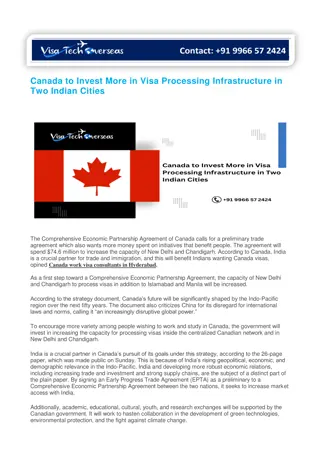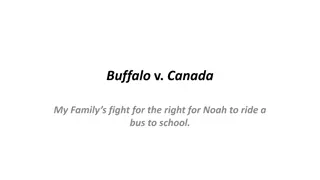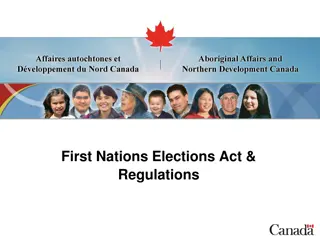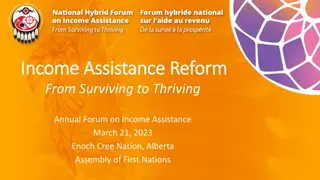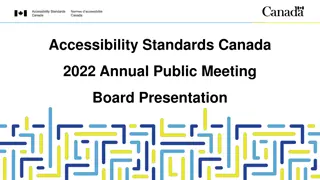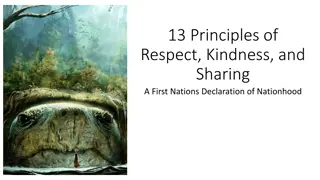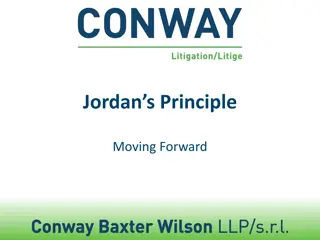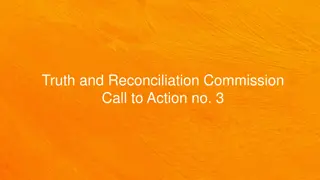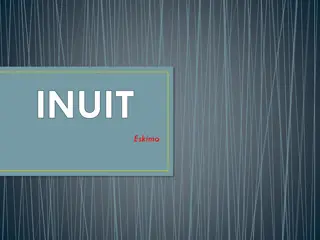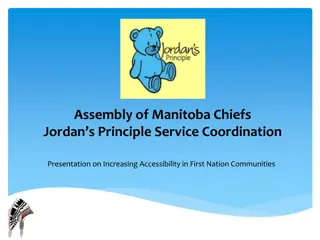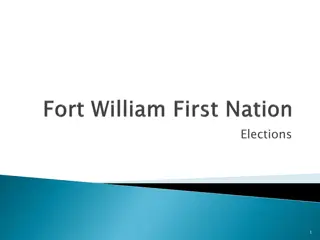Understanding Jordan's Principle and Its Impact on First Nations and Inuit Children in Canada
Jordan's Principle was named in memory of Jordan River Anderson, a young boy whose tragic story led to the establishment of a legal requirement ensuring access to services for First Nations and Inuit children in Canada without delays or disruptions. This principle aims to prevent situations where children face barriers in receiving necessary care, as exemplified by Jordan's own experience. The process involves identifying a child's unmet needs, obtaining necessary documentation, and seeking approvals through a coordinated system. Approvals lead to the provision of services, while denials prompt families to decide on further action.
Download Presentation

Please find below an Image/Link to download the presentation.
The content on the website is provided AS IS for your information and personal use only. It may not be sold, licensed, or shared on other websites without obtaining consent from the author. Download presentation by click this link. If you encounter any issues during the download, it is possible that the publisher has removed the file from their server.
E N D
Presentation Transcript
Brief History: Jordan River Anderson Jordan's Principle is named in memory of Jordan River Anderson, a young boy from Norway House Cree Nation in Manitoba. Jordan was born in 1999 with complex medical needs, which required him to stay in the hospital from birth. When Jordan was 2 years old, doctors determined he could go home, however, the federal and provincial governments could not agree on who should pay for his home-based care. Because of this, Jordan unnecessarily stayed in the hospital until he passed away at the age of 5, never having the chance to spent a day of his short life in his family home, his First Nation, and his loved ones. The First Nation s Child and Family Caring Society and Assembly of First Nations advocated for over a decade to prevent this from happening again and ensure First Nations children do not face barriers in getting the care they need. Together they took the government of Canada to the Canadian Human Right s Tribunal, and in 2016 the Tribunal ordered Canada to fully implement Jordan s Principle. Jordan s Principle is a legal requirement that provides access to services for First Nations in need, without delays, denials or disruptions. This has also expanded to Inuit children.
Eligibility & Process Jordan's Principle is open to all First Nations and Inuit children in Canada with an identified need, regardless of where they live (on and off reserve), or their health or social status. At this time, First Nations children without status can apply for eligibility with acknowledgement from their band. The services that are covered by Jordan s Principle vary according to the nature of the child s needs. There is not a single list of all things that are available. There are a wide range of health, education, social and cultural services that may be eligible to support a child based on their needs. An intake will be completed with a Service Coordination Organization to gather the necessary information and identifying the child s unmet need, a release of information signed by parent/guardian, services/products will be identified to meet the child s unmet need, and supportive documentation from related professionals will be gathered to support the request. The Service Coordinator Organization will then submit the request to the regional Focal Point for review.
Adjudication & Escalation Once all the supportive documentation has been gathered and a request has been completed by the Service Coordination Organization, it will be sent into the region s Focal Point for review. As outlined in the Canadian Human Rights Tribunal order and timelines, decisions should be made within 48 hours, and in urgent cases, a decision should be made within 12 hours. At times the Regional Focal Point adjudicators will require additional information to make a decision, or will need to escalate a decision to National Headquarters in Ottawa for review.
The Verdict: Approvals & Denials Requests submitted by Jordan s Principle Coordinators will come back to the Service Coordinator Organization with approvals or denials. Approvals: Once a request is approved the families will be contacted by the Service Coordinator Organization and informed of the decision. Service providers will be contacted and funds will be allocated as specified in the request. Denials: Denials will also come to Service Coordinator Organization, who will then inform the families. Families then can decide if they accept the denial or if they would like to appeal it. Appeals: Appeals to decisions under Jordan's Principle can be sent to regional focal points across Canada. Jordan s Principle Coordinators will help you start the appeal and work with you throughout the process. Appeals of a request can be made within 1 year of the date of denial. To do so, Families send in a written request to their regional Jordan's Principle focal point. At a minimum, the request for appeal must contain: the child's name and date of birth, the product or service requested, and the date of denial. Although it is not required to begin an appeal, Information that may help to support this appeal may include additional information, such as: assessments, or information to establish substantive equality The appeal process can take up to 30 business days.
Urban Context v.s. Reserve Largely, there are few differences, the process itself is the same. The difference mainly lies in where the family is accessing services and the families support system. Both of these affect the family in gathering letter of recommendations, as well as finding services when they are approved. Other notable differences we have experiences are: finding culturally appropriate and culturally safe services language barriers families in different geographic areas throughout the province families living away from their First Nation/Inuit community (we serve families from over 40 different communities)
Challenges & Barriers Gathering supportive documentation Education community organizations/institutions Establishing eligibility (self determination) Varied awareness of Jordan s Principle within communities (i.e. school board, doctors, Community Services, etc) Implementation of Bill C-92 Lack of culturally safe/competent services
Impacts Educational: Tutoring Services Psychoeducational assessments Educational Personal Assistants (EPAs) Speech Language Therapy Technical or electronic assistance (ex: laptops, chromebooks, iPads, apps) Health: Screening assessments (ex: ADHD, Autism, etc) Transportation to appointments Medical Supplies/Equipment (ex: ramps for wheelchairs, mobility aids, etc) Respite services Social: Daycare Specialized Summer Camps Programming to develop parenting skills Personal Support Worker Cultural: Cultural Mentorship Land Based Activities Attending Cultural Events Accessing Cultural materials (ex: medicines, books,
Questions? Sources: https://fncaringsociety.com/sites/default/files/jordans_principle_information_sheet_november_2018.pdf https://fncaringsociety.com/sites/default/files/infoposter_jp_bilingual_0.pdf https://www.canada.ca/en/indigenous-services-canada/services/jordans-principle.html?utm_campaign=not- applicable&utm_medium=vanity-url&utm_source=canada-ca_jordans-principle https://www.afn.ca/uploads/Social_Development/Jordan%27s%20Principle%20Handbook%202019_en.pdf




